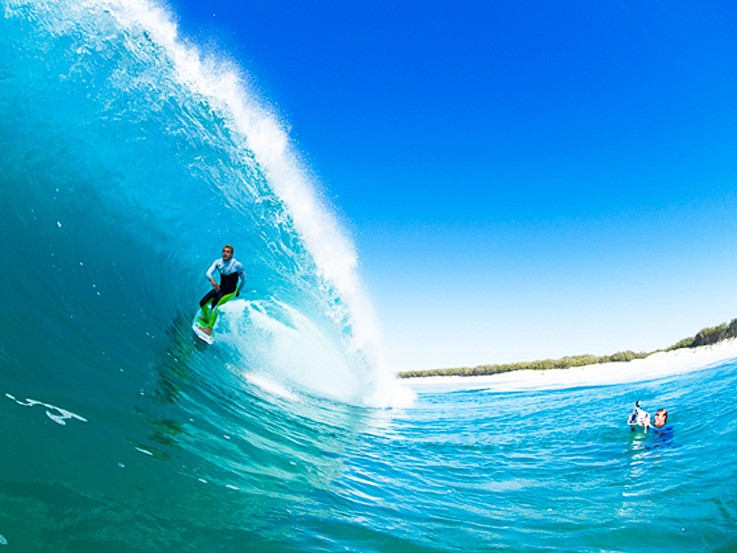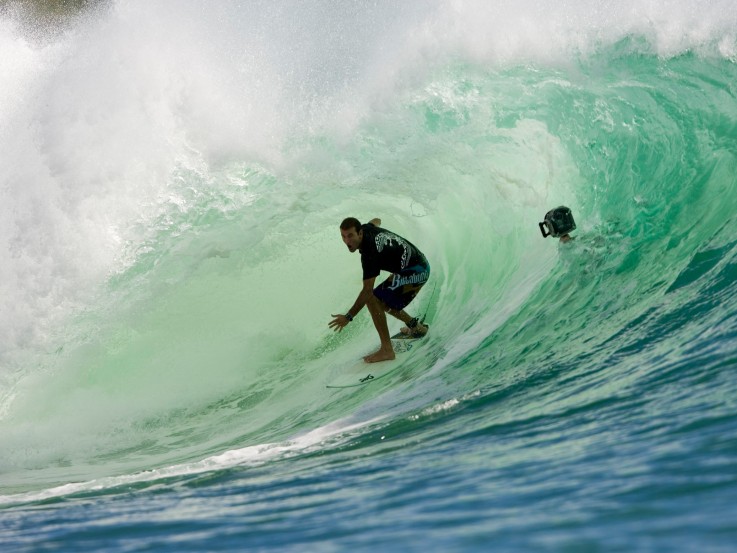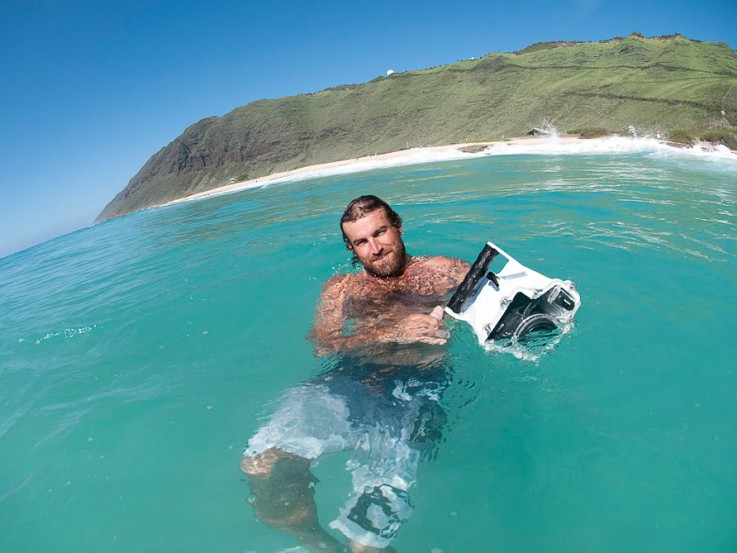Talon Clemow - Director / Producer One Palm Media
In June 2012 a momentous swell coincided with the Volcom Fiji Pro event at Cloudbreak. The event was called off but a devote few - including a host of big-wave surfers - paddled out anyway. This was one of surfing’s most historical days and was captured in Thundercloud - an independent film directed, produced, filmed and edited by Director/Producer Talon Clemow.
How did you get involved in producing surf films?
When I was at school I wanted to be an architect but after failing Advanced Maths in Grade 10, engineering buildings was off the cards. I was already studying Film and Television Studies, as well as surfing and watching a lot of surf movies, so I thought filmmaking would be a good career path. After finishing school I worked as a Videotape Operator at the local television station on the Gold Coast. I was at the bottom of the food chain but still pumped to be working in the industry. I worked my way up to the role of On-air Presentation Coordinator, a role that I actually hated. I was stuck in a dark room with 25 television screens and so far removed from what I wanted to be doing, so I quit my job and went on a surfing holiday. When I came back I started playing in a band pursuing another dream of becoming a musician, but the band broke up and I decided to return to television and my dream of producing surf films.
What makes a good surf filmmaker?
A good filmmaker is someone who is prepared to work hard and is committed – you have to really love it and stick at it. You have to know all about your equipment, understand music and you need to be friends with really good surfers! Being in the water for long periods of time, with heavy gear, is also physically demanding and the strain on your legs and ankles from kicking in flippers is a one-of-a-kind activity. I do a bit of training to keep fit, watch what I eat and don't really drink much (my partying days are thankfully over). Shoots can involve treacherous conditions and you’re often thinking about sharks, so you also need to be prepared for that.
How do you capture your films?
I shoot from a few different perspectives - land angles, from a boat - it will depend on the location and conditions. My preference is definitely shooting from the water, as I like to be close to the action. Capturing good footage is a matter of trying to get in the right spot and at the right time - one of the trickiest things is trying to pre-empt where the surfers are going to be performing a manoeuvrer or pulling into a barrel. This involves using your own interpretation and knowledge of the waves and of surfing, as well as the photographic side of things.
How do you approach the creative aspect of making films?
I try to ensure that when it comes to a concept, the genesis of my ideas is always coming from an original place. When I first starting surfing and watching surf videos, the enjoyment from that made me want to get out and surf. I am always trying to recreate that feeling through my films. My motivation is to bring something to life in a positive manner that might inspire someone, whether that is to get off the couch and go surfing or to jump in a 4 x 4, a boat or on a plane and go exploring!
What has helped you along the way?
When I was working at television stations, my intention was always to learn as much as I could. There are so many different facets of production and I wanted to master them all. I’ve worked in newsrooms and on commercial productions in Australia and in Europe including CNN, the BBC and CNBC, and Transworld International, where I had the opportunity to learn from high-calibre, experienced producers and journalists. When I worked at Billabong we’d always be bouncing ideas off each other and sharing new techniques. Outside of that, my own ambition has always been my biggest driver and having the desire to create something better.
What are the hardest parts about the work you do?
Definitely the financial stress - independent filmmaking takes a certain type of person who can handle a level of uncertainty. I spent close to five months independently producing Thundercloud, without sponsorship and not getting paid, which is really hard when you have bills to pay and a family to support. Crossing the bridge from service provider to independent producer has been a big task - when you work for a brand you get told what to do but when you’re self-employed you have to create your own jobs. This means constantly visualising and creating a project or pitching ideas.
What are the best parts?
Definitely the travel, the people I get to work with, and the continual learning of new techniques and technologies. I’m creating things that are positive and that people can get enjoyment from. It also stokes the surfers out to see themselves in action and doing what they do best. My ambition of being an independent producer is about getting paid to do the things that I love. Getting Thundercloud out of the door was a huge effort and something that was really taxing but at the same time it was a bucket-list moment seeing it on the big screen. Hopefully when I move onto my next concept people will believe in what I can produce, I’ll get some sponsorship money and I can continue to be creative, do what I love and generate an income that will feed my family!
What advice would you give to someone wanting to get into filmmaking?
Be prepared to work hard because filmmaking is not glamorous like the magazines and films sometimes portray. I travel with a 22-kilogram backpack, 20-kilogram roller bag, another 23-kilogram bag and a board bag plus my tripod. This means sometimes I’m carrying 70 to 80 kilograms of luggage on my own. You need to show common sense and know how to deal with different people and cultures. This means being respectful and leaving a light footprint on the places you visit.
Watch the Thundercloud Preview:
Where can we find you online?
| Web: | www.onepalmmedia.com |
| Facebook: | www.facebook.com/onepalmMEDIA |
| Twitter: | @talon1palmmedia |
| Vimeo: | vimeo.com/onepalmmedia |
| Youtube: | www.youtube.com/user/talon1palmMEDIA |
Posted by: Jaclyn Knight, on May 19, 2014
Categories: Interviews
Latest Posts
Craig Sims - White Horses & Surfing Life Publisher
Luke Kennedy - Editor of Tracks Magazine
Simon ‘Swilly’ Williams - Surf Photographer
Jarra Campbell - the Bondi Alchemist
Greg Gordon - Owner of CR Surf
Shayne Nienaber - Surf Photographer
Alexa Hohenberg - Owner of Still Stoked
Christine Deveney - TapaReef Owner & Creator
Russell Ord - Surf Photographer
Richard Kotch - Surf Photographer
Categories
Interviews
Articles
Videos
Press Releases
Quiz
Archive
December 2018
November 2018
October 2018
September 2018
August 2018
July 2018
June 2018
May 2018
April 2018
March 2018
February 2018
January 2018
November 2017
January 2017
December 2016
November 2016
October 2016
September 2016
August 2016
July 2016
June 2016
May 2016
April 2016
March 2016
February 2016
January 2016
December 2015
November 2015
October 2015
September 2015
August 2015
July 2015
June 2015
May 2015
April 2015
March 2015
February 2015
January 2015
December 2014
November 2014
October 2014
September 2014
August 2014
July 2014
June 2014
May 2014
April 2014
March 2014
February 2014
January 2014
December 2013
November 2013
October 2013
September 2013
August 2013
July 2013
June 2013
May 2013
April 2013
March 2013











